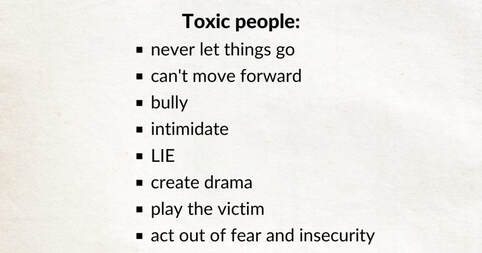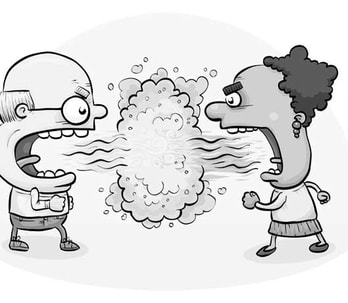God never intends for us to spin our wheels, waste our days, trying to make others happy who can never be happy. It doesn’t depend on us anyway. It’s not up to you. Toxic people may want you to think it does, as if you possess the power to improve the value of their existence, but that’s not a burden meant for you to carry.
God’s greatest desire is to set us free. And sometimes what propels that change is for some brave soul to be willing to say, “Stop, no more.” One who will choose what is better and learn to set boundaries that will protect and limit the control an unhealthy person might be placing on another’s life.
But what if we can't walk away from the toxicity, away from the toxic person?
Gary Thomas gives us some suggestions and insight in his article When We Can’t Walk Away. The following are excerpts from that article.
When we can walk away from toxic people, we probably and usually should. But when financial necessity, work obligations, family relationships, or even the accomplishment of our God-given mission necessitates that we find a way to live or work with a toxic person, we can learn much by following Jesus’ example with Judas.
Though Jesus often walked away and let others walk away, He obviously and clearly kept one toxic person very close to His side — His betrayer, Judas. Let’s focus on three key strategies, based on Jesus’ interaction with Judas, for how we can live with or work alongside toxic people without going crazy ourselves.
Jesus Didn’t View His Mission as Stopping Toxic People from Sinning
Jesus knew Judas was a thief and never chose to stop Him. John clues us in:
One of [Jesus’] disciples, Judas Iscariot, who was later to betray Him, objected, ‘Why wasn’t this perfume sold and the money given to the poor? It was worth a year’s wages.’ He did not say this because he cared about the poor but because he was a thief; as keeper of the money bag, he used to help himself to what was put into it. — John 12:4-6
If John knew Judas was a thief, Jesus knew Judas was a thief. In fact, Jesus knew that Judas was worse than a thief. In John 6:70, Jesus said,
“Have I not chosen you, the Twelve? Yet one of you is a devil!” (He meant Judas, the son of Simon Iscariot, who, though one of the Twelve, was later to betray Him.)
Jesus knew Judas was toxic. He could have stopped Judas from stealing and His future betrayal by kicking Him out of their group at any time.
But He didn’t. Why? Jesus kept the bigger mission in mind. To seek first God’s Kingdom, He had to raise up a band of disciples. He also had to die on the cross. He wasn’t waylaid by individual battles of piety with His disciples, as we are prone to do with people around us. Addressing Judas’s thievery would be like a neurosurgeon clipping someone’s fingernails. There were more important issues at hand. And Jesus’ mission was not to stop everybody from sinning.
This is actually a freeing word for believers. Your mission is not to confront every sin you hear or know of, even among your perhaps toxic family members or coworkers. Of course, if you’re a parent of a child still living at home, confronting sin is an appropriate part of spiritual training. But at extended family gatherings, with hard-hearted friends and certainly coworkers, our job isn’t to be “sin detectives” who discover how others are messing up and then unleash havoc by sharing our opinions with those who don’t want to hear them.
Jesus could have spent all twenty-four hours of every day trying to confront every one of His disciples’ sins. “Peter, put away that anger!” “Thomas, you’re still doubting Me, aren’t you?” “Thaddeus, you’re people-pleasing again. Nobody likes a suck-up.”
Instead, He focused on training and equipping reliable people. Focusing on others’ sin makes you focus on what’s toxic. Focusing on training makes you focus on what is good and on who is reliable. The latter is a much more enjoyable and ultimately much more productive life.
Feel free to enjoy people and love them without having to serve as their conscience.
When asked sincerely, speak the truth. Just know that merely witnessing sin in your presence doesn’t require you to act as prosecuting attorney, judge, and jury.
Keep the bigger picture in mind. Instead of upending the holiday gathering by making sure everyone knows you disapprove of what that child, cousin, uncle, or parent is doing, find a hungry soul to quietly encourage, bless, inspire, and challenge. Find the most “reliable” relative and invest in them.
How much money would you spend to get an hour to ask Jesus all the questions you’ve ever wanted to ask Him?
What would it be worth to you to go back to the first century and spend an entire weekend with Jesus, watching Him perform miracles, listening to His teachings, participating in private conversations, watching Him pray and interact with others?
All of which makes Judas’s betrayal seem all the more ungrateful. Jesus gave him a front row seat to the most significant life ever lived, and Judas sold Him out.
And yet at the Last Supper, when Jesus washed His disciples’ feet, Jesus made sure that Judas was still present. In a picture the sheer wonder of which leaves me in awe, Jesus used the two holiest hands that have ever existed, the two most precious hands in the history of humankind, the hands pierced for our salvation — Jesus took those exquisite hands and washed the feet of His toxic betrayer.
Even in the face of ungratefulness and malice, Jesus kept the door open to relational reconciliation. He loved Judas to the end, essentially saying,
“You can’t make Me hate you. Your toxicity won’t become My toxicity.”
Just as astonishing to me is what happened during the act of betrayal. When Judas walks up to Jesus to hand Him over to the soldiers, Jesus looks at Judas and says,
Do what you came for, friend. — Matthew 26:50
Friend? How about skunk? How about snake? Jesus said “friend” because Jesus didn’t have a toxic molecule in His body. There was nowhere for toxicity to take root. God is radically for people. He wants everyone to come to a knowledge of the truth (1 Timothy 2:4). As His followers, we also must be for everyone, even if we oppose what they’re doing. If we must live and work with toxic people, our call is to make sure their toxicity doesn’t become ours. We don’t treat them as they treat us. We don’t offer evil in exchange for evil. We love. We serve. We guard our hearts so that we are not poisoned by their bad example.
While Jesus invited Judas back into relationship until the very moment of betrayal, washing his feet and even calling him friend, He never pretended that what Judas was doing wasn’t toxic. In fact, He warned Judas at the Last Supper that if he were to go through with his plans, things wouldn’t end well for him:
Woe to that man who betrays the Son of Man! It would be better for him if he had not been born. — Mark 14:21
When Judas kissed Him in Gethsemane, Jesus replied,
Are you betraying the Son of Man with a kiss? — Luke 22:48
When working around toxic people, you don’t have to pretend they’re not toxic. You don’t have to pretend they are well-meaning but perhaps misguided.
The reason this is good news is that it helps preserve our sanity. Toxic people are experts at twisting things, making us feel crazy for admitting the truth (what counselors call gaslighting). But as followers of Jesus, we are committed to the truth because we are committed to Jesus, who said,
I am the way and the truth and the life. — John 14:6, emphasis added
Without truth as a refuge, interacting with crazy people can start to make you feel crazy. But God is a God of order. Craziness is a clear sign of toxicity.
This will sound like such a cliché, but I’ve found that extra praying brings some level of sanity to a situation that feels crazy. There’s something about spending time talking to and listening to the God of truth that restores sanity when you’re forced to spend time in a place that makes you feel like you’re losing your mind.
As we trust that God understands all that is truly going on, and as we remember that God is the only one capable of bringing everything to account, we can rest in His understanding, promise, and protection:
Do not be anxious about anything, but in every situation, by prayer and petition, with thanksgiving, present your requests to God. And the peace of God, which transcends all understanding, will guard your hearts and your minds in Christ Jesus. — Philippians 4:6-7
Takeaways
Sometimes we can’t walk away but have to learn how to live or work around toxic people. This will require us to become stronger than we’ve ever been before.
- Don’t try to control a controller. Work around them as you are required to, but don’t let their ups and downs become your ups and downs. Keep a healthy level of distance between the two of you.
- Keep first things first. Our job isn’t to stop people from sinning. Focus on investing in reliable people.
- Guard against letting someone else’s toxicity tempt you to respond in a similarly toxic fashion. We can’t control what toxic people do and say, but we can control what we do and say.
- Don’t allow someone who is ruining their life to ruin yours as well. Leave work at work (or family drama at family gatherings).
- Thank God that we never have to pretend crazy isn’t crazy. We live by the truth.
We don’t have to pretend toxic people aren’t toxic; we just have to learn a nontoxic way of interacting with them.
We should stop asking God to change the other person, because He won’t in most cases, but ask Him to change us and our attitude. If we are always concerned about the way others interact with us we will always maintain a victim mentality always blaming others we will never walk in the victory that Jesus promises.



 RSS Feed
RSS Feed